Front Cover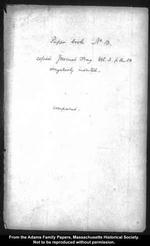
Paper Book No. 13.
copied Journal Frag. Vol. 3 p 4-50
irregularly inserted.
[The preceding text was added in the handwriting of Charles Francis Adams]
compared.
[The preceding text was added in the handwriting of Charles Francis Adams]
Inside Front Cover
Page i
Page ii
Page iii
Page iv
Page 1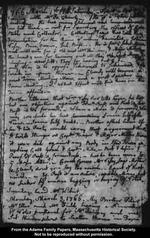
1766 MARCH 1ST. SATURDAY.
Spent a Part of last Evening with Mr. Jo. Cleverly. He is a Tiptoe for Town Meeting. He has many Schemes and Improvements in his Head-vizt. for seperating the offices of Constable and Collector.Collecting Taxes has laid the Foundation for the Ruin of many Families -- John Vesey, Ben. Owen, Jed. Bass. He is for 5 select Men and will vote for the old ones Mr. Quincy, and Major Miller. He hears they are for turning out all the old select Men and chusing a new sett: they [are] for having but 3 &c. The only Way is to oppose Schemes to Schemes, and so break in upon them. -- Cleverly will become a great Town Meeting Man, and a great Speaker in Town Meeting. Q. What Effect will this have on the Town Affairs.
Brother tells me, that Wm. Vesey Jur. tells him, he has but one Objection against Jona. Bass, and that is, Bass is too forward. -- When a Man is forward, We may conclude he has something some selfish View, some self Ends. -- Brother asked him if he and his Party would carry that Argument thro? It holds stronger vs.Captn. Thayer and Major Miller than it ever did against any Body in this Town excepting Coll. Gooch and Captn. Mills. But I desire the Proof of Bass's forwardness. Has he been more so than Major Miller? -- Come Come Mr. Vesey, says Master Jo. Cleverly, dont you say too much. I ant of that mind.
Ego. Bass is an Active, capable Man, but no seeker by mean begging or buying of Votes.
SUNDAY [2 MARCH].
Heard Mr. Wibirt.
MONDAY. MARCH 3. 1766.
My Brother
Peter, Mr. Etter and Mr. Field, having a Number of Votes prepared for Mr. Quincy and me, set themselves to scatter them in Town
Page 2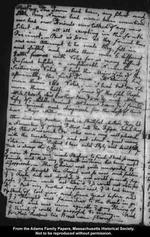
Meeting. The Town had been very silent and still, my Name had never been mentioned nor had our Friends ever talked of any new Select Men
att all, excepting in the south Precinct. But as soon as they found their was an Attempt to be made, they fell in and assisted, and,
altho there were 6 different
Hatts,
[illegible] with Votes for as many different Persons, besides a considerable Number of Scattering Votes, I had the Major Vote of the Assembly, the first Time. Mr. Quincy had more than 160 Votes. I had but one Vote more than half. Some of the Church People, Mr. Jo. Cleverly, his Brother Ben. and Son &c. and Mr. Ben. Vesey of the Middle Precinct, Mr. James Faxon &c. I found were grieved and chagrined for the Loss of their dear
Major Miller.
Etter and my Brother took a skillful Method. They let a Number of young Fellows into the Design. John Ruggles, Peter Newcomb, &c. who were very well pleased with the Employment and put about a great many Votes. Many Persons, I hear acted slyly and deceitfully. This is always the Case.
I own it gave me much Pleasure to find I had so many Friends, and that my Conduct in Town, has been not disapproved. The Choice was quite unexpected to me. I thought the Project was so new and sudden that the People had not digested it, and would generally suppose, the Town would not like it, and so would not vote for it. But my Brothers answer was, that it had been talked of, last year, and some Years before, and that the Thought was familiar to the People in general, and was more agreable than any Thing of the Kind, that could be proposed to many. And for these Reasons his Hopes were strong.
Page 3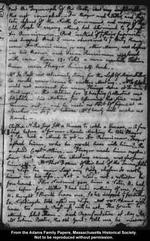
But the Tryumph of the Party was very considerable, tho not compleat. For Thayer and Miller, and the late Lessees of the North Commons, and many of the Church People and many others, had determined to get out Deacon Penniman. But instead of that, their favourite was dropped, and I, more obnoxious to that Party than even Deacon Penniman, or any other Man, was chosen in his Room, and Deacon Penniman was saved with more than 130 Votes, a more reputable Election than even Thayer himself had.
Mr. Jo. Bass was extreamly sorry for the Loss of Major Miller, he would never come to another Meeting. Mr. Jo. Cleverly could not account for many Things done at Town Meetings. His Motion for Choosing Collectors was slighted -- his Motion for lessening his fine was thrown out -- and he made no Sort of figure as a Speaker. So that I believe Mr. Cleverly will make no Hand.
Elisha Niles says
Sett a Knave to catch a Knave. A few days before a former March Meeting he told
Thayer that he had a Mind to get in
Deacon Penniman.
Thayer asked him, who he would have with him? He answered Captain Allin. Thayer made him no Answer, but, when the Meeting came, was chosen himself. -- Mr. Thomas Faxon of this End of the Town, told
my Wife he never saw
any Body chosen so neatly in his Life. Not a Word -- not a Whisper before hand. Peter Newcomb gave him a Vote. He had one before for
Miller, and had heard nothing of me. But He thought I should have one. So he dropped that for
Miller. Jo. Nightingale asked
my Wife,
Mr. Adams will have too much Business, will he not. The Courts to attend -- Select Manand Representative at May, &c. Mr. John Baxter, the old Gentleman, told me, he was very
Page 4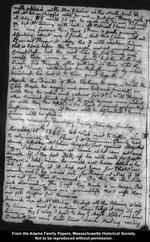
well pleased with the Choice at the North End, &c. Old Mr. John Ruggles voted for me. But says that
Thayer will
[be elected] at May. If I would set up, he would vote for me, and I should go, but Mr. Quincy will not. Lt. Holbrook I hear was much in my
favour &c. Thus the Town is pretty generally disputing about me, I find. But this Choice will not disconcert
Thayer at May,
tho it will weaken him. But as I said before the
Tryumph was not
compleat. Cornet Bass had the most Votes the first Time, and would have come in the Second, but the North End People, his Friends, after putting in their Votes the first Time, withdrew for Refreshment, by which Accident he lost it, to their great
Regrett.
Mark the Fruits of this Election, to me. Will the Church People be angry, and grow hot, and furious? Or will they be cooler and calmer for it? Will Thayers other Precinct friends resent it, and become more violent, or will they be less so? -- In short, I cannot answer these Questions. Many of them will be disheartened I know. Some will be glad.
TUESDAY, WEDNESDAY, THURDSDAY,FRYDAY, SATURDAY, SUNDAY [4-9 MARCH.]
MONDAY. 10TH. 1766.
Last Week went to Boston, and to Weymouth, &c. I hear that Mr. Benjamin Cleverly has already bespoke Mr. John Ruggles Jur., against May Meeting. Promis'd him, as much as he can eat and drink of the best Sorts, if he will vote for Captn. Thayer. Told him he would not have acted as he did at March, if it had not been for Thos. Newcomb, and that he would vote for Thayer at May, if it was not for Thos. Newcomb. By this, the other Side are allarmed. The Craft they think is in danger. But I believe their Fears are groundless, tho I wish there was good Reason for them.
Drank Tea at Mr. Etters. He says all the Blame is laid to him, and that a certain Man takes it very ill of him. -- By the Way, I heard
to day that
Major Miller and James Brackett Jur. were heard since March Meeting raving
Page 5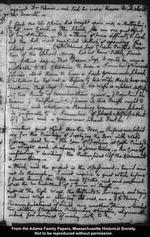
against Deacon Palmer, and said he was a Knave &c. Q. about this
Quarrell?
I find the late Choice has brought upon me, a Multiplicity of new Cares. The Schools are one great Object of my Attention. It is a Thing of some difficulty to find out the best, most beneficial Method of expending the school Money.Captn. Adams says that each Parishes Proportion of the School Money, has not been settled, since my fathers day. Thos. Faxon says, it would be more profitable to the Children, to have a Number of Womens Schools about than to have a fixed Grammar School. Q. Whether he has not a Desire that his Wife should keep one? Jonathan Bass says the same. Q. his Wife is a School Mistress. So that two Points of Examination occur -- the Proportion between the Parishes, i.e. the Sum which this Parish ought to have, and whether a standing Grammar school is preferable to a Number of school Mistresses Part of the Year and a Grammar School Part.
Another great Object, Are the Poor. Persons are soliciting for the Priviledge of supplying the Poor, with Wood, Corn, Meat &c. The Care of supplying at Cash Price, and in Weight and Measure, is something. The Care of considering and deciding the Pretensions of the Claimants is something.
A Third, and the greatest is the Assessment. Here I am not so thorough. I must enquire a great While before I shall know the Polls, and Estates, real and personal, of all the Inhabitants of the Town or Parish.
The high Ways, the Districts to Surveyors, and laying out new Ways or altering old ones, are a 4th. Thing.
Perambulations of Lines, are another Thing. -- Dorchester, Milton, Stoughton, Bridgwater, Abington, Weymouth. Orders, for Services of many Sorts, to &c.
Page 6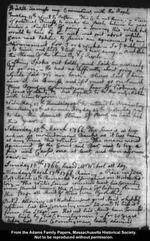
It will increase my Connections, with the People.
TUESDAY 11TH.
Went to Boston. The [Chief ] [Justice] not there. A Piece of political Finess, to make the People believe he was under a Necessity of going a journey this Week, but would be here by the next, was put about while Care was taken, to secure an Agreement to an Adjournment for 3 or 4 Weeks. So that Hutchinson is to trim, and shift, and luff up and bear away. And elude the Blame of the Ministry and the People.
Cushing Spoke out boldly and said he was ready to go on. He had no Difficulty about going on. Lynde said We are here. Oliver said here am I, in Duress, and if I must go on, I must. Thus Popular Compulsion, fear of Violence, of the Sons of Liberty, &c., was suggested to he the onlv Motive with him to go on.
WEDNESDAY. 12TH. Thursday 13th &c
Returned to Braintree.
FRYDAY 14TH.
Yesterday and to day the severest Storm of Snow, we have had this Year.
SATURDAY 15TH. MARCH 1766.
The Snow is as deep and in as mountainous Banks, as it has been at any Time this Winter. -- The unanimous Agreement of the Court and Bar, was, to try a few civil Causes, one at least, and then adjourn over.
SUNDAY 16TH. 1766.
Heard Mr. Wibirt all day.
MONDAY MARCH 17TH. 1766.
Rain. A Piece in Even [Evening] Post March l0th. Remarks and Observations on Hutch's [Hutchinson's] History. The Writer seems concerned least his Country men should incur the Censure of hissing from the stage all Merit of their own Growth.
But Q. Allowing Mr. Hutchinsons great Merit, what Disposition has his
Country men discovered to hiss it from the Stage? Has not his Merit been sounded very high by his
Country men? -- for 20 Years? Have not his Countrymen loved, admired,
Page 7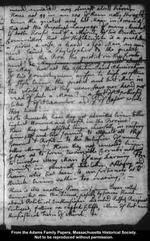
revered, rewarded, nay almost adored him? Have not 99 in an l00 of them really thought him, the greatest and best Man in America? Has not the Perpetual Language of many Members of both Houses, and of a Majority of his Brother Councillors
[been], that Mr. Hutchinson is a great Man, a pious, a wise, a
learnd, a good Man, an eminent Saint, a
Phylosopher &c., the greatest Man in the Province, the greatest on the Continent?
Nay have not many proceeded almost to Nay has not the Affection and Admiration of his Countrymen, arisen so high, as often to style him, the greatest and best Man in the World? that they never saw nor heard, nor read of such a Man? -- a Sort of Apotheosis like that of Alexander and that of Caesar while they lived?
As to Rewards, have they not admitted him to the highest Honours, and Profits, in the Province? Have they not assisted him chearfully in raising himself and his family to allmost all the Honours and Profits - to the Exclusion of much better Men? Have they not rewarded him so far, as to form invincible Combinations to involve every Man of any Learning and Ingenuity, in generall Detestation, Obloquy, and Ruin, who has been so unfortunate as to think him rather too craving?
There is also another Piece, in the same Paper, called Remarks on the Times, possibly by the same Hand-about Political Enthusiasm, disordered Pulses, Precipices, Vertigoes, falling on ragged Cliffs, Men of hot enthusiastical Turn of Mind, &C.
Page 8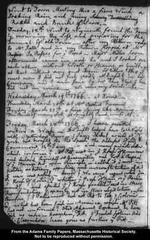
Went to Town Meeting thro a fierce Wind, a soaking Rain, and miry Snowy Travelling Roads and Banks of Snow.
TUESDAY. 18TH.
Went to Weymouth, found the Family mourning the Loss, and preparing for the Funeral of old Tom. -- After my Return, rode to Mr. Halls, and in my Return stopped at Mr. Basses Jo. Basses, for the Papers. Major Miller soon afterwards came in, and he and I looked on each other, without Wrath or shame or Guilt, at least without any great Degree of Either, 'tho I must own I did not feel exactly as I used to in his Company, and I am sure by his Face and Eyes, that he did not in mine. We were very Social, &c.
WEDNESDAY. MARCH 19TH. 1766.
At Home.
THURSDAY MARCH 20TH.
At Mrs. Baxters Funeral.
FRYDAY MARCH 21ST.
A fine Spring like Morning. The Birds of many Sorts, as sprightly and musical.
FRYDAY, MARCH 28TH. 1766.
I have omitted writing a Week. Dr. Tufts lodged here last Night with Yesterdays Paper. The Jany. Packet, arrived at N. York, has brought the K's [King's] Speech, the Address of Lords and Commons, 14th. Jany., and many private Letters, which inform that Mr. Pitt was in the House of Commons and declared himself vs. Greenville [Grenville], and for a Repeal of the Stamp Act, upon Principle. Called it, the most impolitic, arbitrary, oppressive, and unconstitutional Act that ever was passed. Denyed that We were represented in the House of Commons. (Q. whether the House of Commons, or the Parliament). And asserted that the House granted Taxes in their Representative Capacity, not in their Legislative. And therefore, that the Parliament had not Right to tax the Colonies.
Q. What has been said in America which Mr. Pitt has not confirmed? Otis, Adams, Hopkins, &c. have said no more. Hampden, F.A., the Feudal System And Lord Clarendon, have gone no further than Pitt.
Page 9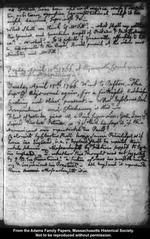
No Epithets have been used in America worse than impolitic, arbitrary, oppressive, unconstitutional, unless it be cursed, damned, supercursed &c.
What shall we think of Mr. Pitt? What shall we call him? The Genius, and Guardian Angell of Britain and British America? Or what? Is it possible that Greenville, offensive to his K [King],dissagreable to the People, should prevail vs. the whole new Ministry and Mr. Pitt?
FRYDAY APRIL 10TH. 1766.
At Plymouth. Court open and Business proceeding.
TUESDAY APRIL 15TH. 1766.
Went to Boston. The Superior Court adjourned again, for a fortnight. Hutchinson, Cushing and Oliver, present. What Insolence And Impudence, and Chickanery is this?
Fleet of Yesterday, gives us, a Piece from [London ] [Gazette] Jany. 8th. signed Vindex Patrix. The sole [Question] he says is, if the Americans are represented in Parliament?
Colonists by Charters shall have same Priviledges, as if born in England, i.e. that England shall be reputed their natale solum. Massachusetts by Fiction supposed to lye in England. -- Q. whether this Thought was not suggested by the [Braintree] Instructions? "a fiction of Law insensible in Theory and injurious in Practice?" All England is represented, then [illegible] Massachusetts is.
Page 10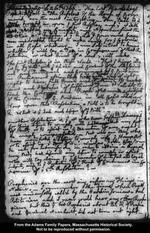
SATURDAY APRIL 26TH. 1766.
The last Thurdsdays Paper is full. The Resolves of the House of Commons, are the most interesting. The Bill which is to be brought in upon the first Resolve, and the Sixth has excited my Curiosity and Apprehensions the most. The Ist. Resolve is that K., Lds. and Commons have an undoubted Right to make Laws for the Colonies in all Cases, whatever. -- I am solicitous to know whether they will lay a Tax, in Consequence of that Resolution, or what Kind of a Law they will make.
The first Resolve is in these Words. "That the Kings Majesty, by and with the Advice and Consent of the Lords Spiritual and Temporal, and Commons of G. Britain in Parliament assembled, had, hath, and of right ought to have, full Power and Authority to make Laws and Statutes of sufficient Force and Validity to bind the Colonies and People of America, Subjects of the Crown of G. Britain, in all Cases whatever." Now upon this Resolution, a Bill is to be brought in. Q. What is the End and design of that Bill?
Another Resolution is, that all who have suffered Damages for their Desire to comply with [illegible] any Act of Parliament, or to assist in the Execution of any, ought to be amply compensated. -- But who are they, who have manifested a Desire to comply with the stamp Act, or to assist in the Execution of it? Winslow, Foster, Clap, Brown &c. were for Submission, in order to obtain a Repeal. Every Body has disowned any desire to comply or assist. Who will lay claim to the Character of dutiful and loyal Subjects, and to the Protection of the House of Commons in Consequence of the 5th Resolution?
Prophecies are the most airy, visionary Things in Nature. I remember the Time, when Pratt was universally
call'd by the Hutchinsonians a bad Politician, and I never could hear any other Reason given, but this that his Prophecies about the K. of Prussia and General Amherst, did not turn out right.
Page 11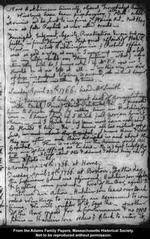
Now
Hutchinson himself, Olivers, Trowbridges, Ruggles's, Winslows, have been prophesying, that Fleets and Armies would be sent to
inforce the stamp Act. But they are as false Prophets as ever uttered oracles.
Foresight, Judgment, Sagacity, Penetration, &c. are but very feeble, infirm Things, in these great affairs of State and War. What Hutchinson [said] in the Probate office was as good a Way as any, -- I never was more at a loss in my Life, about any Thing future! What the new Ministry will do, I know not. If Mr. Pitt was in I should be at no loss at all. -- In this Way, an Air of deep important Wisdom is preserved, without danger of being proved mistaken by time.
SUNDAY APRIL 27TH. 1766.
Heard Mr. Smith.
In the Evening, I had a great deal of Conversation with Ezekiel Price,Yesterday about Politicks, &c. I provoked him to speak freely by calling him an Hutchinsonian. -- I swear says he I think the Lieutenant Governor an honest Man, and I think he has been most damnably abused and slandered and bely'd, &c. I know all his violent Opposers -- I know them and what they are after, and their disciples in and about the Capital. There is no Man in the Province would fill any one of his offices, as he does. He is the best judge of Probate, &c.Flings about Otis and Adams, and about being one of their Disciples, &c.
MONDAY APRIL 28TH. 1766.
At Home.
TUESDAY APRIL 29TH. 1766.
At Boston. To this day the
Superiour Court was adjourned:
Hutchinson, Lynde and Cushing were present. Two of the Bar, agreed to continue an Action.
Hutchinson leans over and orders Winthrop to minute an Agreement to continue. We will consider of it, says he. Another of the Bar, moved for a Continuance and no Opposition.
Hutchinson orders the Clerk to enter it,
Page 12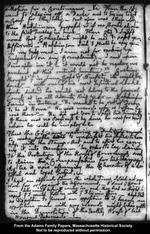
a Motion for a Continuance, &c. Then the Court went to playing off a Farce, and to trying to get a Cause for the Jury. But none was then ready. Then
Hutchinson proposed, what if we should adjourn to the first Tuesday in June. Then Otis and Swift moved that Complaints might be read and passed upon. Affirmed.
Hutchinson said, "I shall be very open in my Judgment. I am not for making up Judgment on any Complaints. I am upon Principle in it -- it would not be regular, nor prudent at this critical Juncture." Cushing thought "that in some Cases of Necessity, it might be done" with one of his most Jesuitical Looks. Lynde declared he would not belong to the General Court, in all Advents, this Year.
Hutchinson seemed in Tortures. -- "He wanted to be out of Town, to be at Home. He was never so easy as when he was there. He did not love to spend his Time idly. If there was no Business to be done, he was for being where he could be
imploy'd."
Thus the C.J. is now mustering up Fortitude enough to make public [illegible] , to manifest his Desire to comply, with the Stamp - Act, and to assist in carrying it into Execution. In Order to lay claim to the Protection of the House of Commons, and to claim the a Compensation for his Damages. Ay! he is now assuming the Character of a dutiful and loyal Subject.
I kept an obstinate Silence, the whole Time, I said not one Word for, or against the Adjournment. I saw the Court were determined before they came in, and they had no Right to expect that I would fall in with that Determination. And I had no Disposition to foment an opposition to it, because, an Opposition made with any Warmth might have ended in the Demolition of the Earthly House of his Honours Tabernacle.
Page 13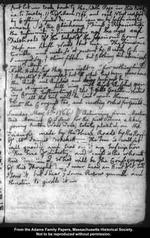
But let me look back to the Sixth Page in this Book, i.e. to Tuesday. 11th. of March 1766, and read, What was said by Cushing, Lynde &c. -- and can we be sufficiently amazed at the Chickanery, the Finess, the Prevarication, the Insincerity, the simulation, nay the Lyes and Falshoods of the Judges of the Superiour Court. These are harsh Words, but true. The Times are terrible, and made so at present by Hutchinson C.J. I cannot say, that Oliver fibbed, but Cushing did abominably on 11th. March.
Nathaniel Hatch says they are right "for nothing hindered the Repeal of the Stamp Act, but what has been done here -- the Riots, and Resolves, and doing Business &c."
Thus America will ring with Riots, Resolves, opening Courts, Instructions, Edes & Gills Gazette -- Writers &c. All the Evil will be laid upon them -- and the Congress too, and recalling Orders for Goods.
SUNDAY. MAY 4TH. 1766.
Returning from Meeting this Morning I saw for the first Time, a likely young Button Wood Tree, lately planted, on the Triangle made by the Three Roads, by the House of Mr. James Brackett. The Tree is well set, well guarded, and has on it, an Inscription "The Tree of Liberty," and "cursed is he, who cutts this Tree."-- Q. What will be the Consequences of this Thought? I never heard an Hint of it, till I saw it, but I hear that some Persons grumble and threaten to girdle it.
Page 14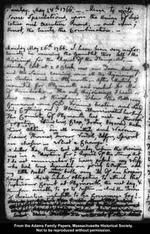
SUNDAY. MAY 18TH. 1766.
Mem. to write some Speculations, upon the Union of Legislative and Executive Powers -- and upon the Knot, the junto, the Combination.
MONDAY MAY 26TH. 1766.
I have been very unfortunate, in running the Gauntlet, thro all the Rejoicings, for the Repeal of the Stamp - Act.
Monday last at 2 O Clock, was our Town Meeting, and the same Evening, were all the Rejoicings in Boston and in Plymouth. After Meeting I mounted for Plymouth, and reached Dr. Halls of Pembroke. The only Rejoicings, I heard or saw were at Hingham, where the Bells rung, Cannons were fired, Drums beaten, and Land Lady Cushing on the Plain, illuminated her House. The County of Plymouth has made a thorough Purgation, Winslow, Clap, Foster, Hayward, Keen, Oliver, Alden, are all omitted, and Warren, Seaver [Sever], Thomas, Turner, Vinal, Edson, Sprout are chosen. What a Change!
A duller Day, than last Monday, when the Province was in a Rapture for the Repeal of the Stamp Act, I do not remember to have passed. My Wife who had long depended on going to Boston, and my little Babe [illegible] were both very ill of an hooping Cough. My self, under Obligation to attend the Superiour Court at Plymouth, the next day, and therefore unable to go to Boston. And the Town of Braintree insensible to the Common Joy!
Page 15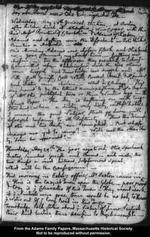
WEDNESDAY. MAY 28TH.
General Election. At Boston. After Lecture, dined at Mr. Austins, the Wine Cooper, with the Revd. Messrs. Prentice of Charlestown and [Amos] Adams of Roxbury. Adams and Austin were the Disputants in Politicks, Prentice a Moderator.
This Morning [Samuel] Adams was chosen Clerk, and Otis Speaker. Govr. Bernard negatived him. Cushing was chosen. In the Afternoon they proceeded to choose Councillors, when Hutchinson, and the two Olivers were dropp'd, and Trowbridge was dropped, and Mr. Pitts, Coll. Gerrish, Coll. White, Bowers, Powel, and Mr. Saunders and Dexter, were chosen. -- What a Change! This Day seems to be the litteral Accomplishment of a Prophecy of Mr. Otis, published two or three Winters ago in the News Paper "The Day is hastening on, with large Strides, when a dirty, very dirty, witless Rabble, I mean the great Vulgar, shall go down with deserved Infamy to all Posterity." Thus the Triumph of Otis and his Party are compleat. But what changes are yet to come? Will not the other Party soon be uppermost?
THURDSDAY, MAY 29TH.
The Governor negatived Otis, Sparhawk, Dexter, Saunders, Gerrish and Bowers, and made the two Houses a most nitrous, sulphureous Speech.
What will be the Consequence?
This morning in Hatch's Office, Mr. Paxton came in. "This is the lazyest Town upon the Globe -- poor, proud and lazy is the Character of this Town. They wont work. If the Neutrals were gone, there would be no body to throw the Water out of the long Boat in this Town."
Trowbridge told Stories about the Virtue of some Neutrals-their strict justice, there Aversion to
Prophaneness &c.
Page 16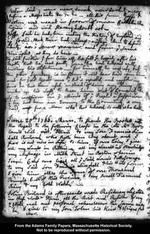
Paxton said they were never drunk, never disorderly, never before a Magistrate &c. &c. &c. All this from Goffe and Paxton, was meant in
favour of roman Catholic Religion and civil slavery I doubt not.
Goffe said he had been reading the History of England, and he found that there had always arisen Men to defend Liberty, in the same manner, and from the same Principles, as they do here.
He said further that for himself, he felt so happily after his Death, that he was pretty sure he had behaved well during his Lifetime. For himself, he was easy, but the poor Secretary is infirm; it will bear hard upon him. And for the Lieutenant Governor, now the Act is repeal'd, and considering how he has been used, instead of doing any Thing to make up his Loss, to leave him out of Council, and so to confirm in the Minds of the People a suspicion that he has been an Enemy to the Country, is very hard, for a Man who has behaved so well as he has
JUNE 20TH. 1766.
Mem. to search the Books, with the Regard to the following Clause in the late Mr. Borlands Will, vizt. "Item, to my Son Francis Lindall Borland, who hath been long absent, and I fear is not now in Life, to him, if now living, I give all my Lands in Billerica, all my Lands in Sturbridge, my Messuage in Milk Street in Boston wherein Joseph Calef now lives, all the said Lands and Messuage to my said Son Francis Lindall and his Heirs forever. I give him allso the Sum of one Thousand Pounds l.M. of this Province, and my small Diamond Ring and my Gold Watch."
John Borland is afterwards made Residuary Legatee in these Words "Item, all the Rest and Residue of my Estate, real and personal, wheresoever the same may be, I give to my Son John his Heirs and Assigns for ever."
Page 17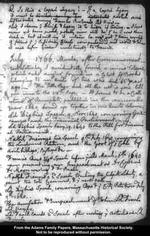
Q. Is this a lapsed Legacy? If a lapsed Legacy it must be divided, among Fr distributed parted and distributed among Francis Borlands Right Heirs.
But, I observe the Devise and Legacy is to him, if living. It has never yet been proved, probably never will be, that he was then dead, but admitting it certain he was not then living, would it follow that the Residuary Clause comprehended and extended to John what was before given conditionally to Francis.
[21] JULY 1766.
Monday after Commencement. Last Saturday, I accidentally found a curious Volume, which Oaks Angier found in a Chest of Books belonging to an Uncle of his who died 45 Years ago. The Title Page and all the rest is gone till you come to the 18th. Page. It seems to be a Collection of Pamphlets, published in the memorable Year 1640, bound up together, in one Quarto Volume.
Lord Digbies Speech. 9. Novr. 1640, concerning Grievances and the Triennial Parliament.
Lord Digbies Speech Jany. 19. 1640 to the Bill for Triennial Parliaments.
Nathl. Fiennes his Speech 9th. Feby. 1640. concerning the Londoners Petition, and the Government of the Church by Archbishops, Bishops &c.
Francis Rous Esqrs. Speech before the Lords March 16th. 1640 upon presenting an Impeachment vs. Dr. Cossens, Dr. Maynwaring and Dr. Beale.
Nathl. Fiennes's 2d Speech touching the Subjects Liberty, against the late Cannons, and the new Oath.
Lord Digbies Speech, concerning Bishops and the City Petition Feby. 9th. 1640
The Accusation and Impeachment of John Lord Finch Lord Keeper.
Lord Faulklands 2d Speech after reading the Articles vs. Lord Finch.
Page 18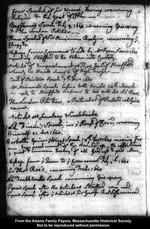
Four Speeches of Sir Edward Deering concerning Religion and the Government of Church.
Bagshaws Speech Feby. 9. 1640 concerning Episcopacy and the London Petition.
Three Speeches of Sir Benjamin Rudyer, concerning .the Clergy, &c.
Message from Commons to Lords by Mr. Pym Novr. 11 . 1640 requesting Strafford to be taken into Custody.
Articles of Impeachment vs. Thomas Earl of Strafford whereby he stands charg'd of High Treason.
Earl of Bristows Speech 7th. Decr. 1640.
Mr. Mainards Speech before both Houses. 24th. March in reply to Straffords Answer to his Articles at the Bar.
The London Petition, a Particular of Prelatical Grievances.
Articles vs. Secretary Windebanke.
Lord Finch's Speech, in the House of Commons, concerning Himself 21.Decr. 1640.
Harbottle Grimstones Speech 18th. Decr. 1640 moving for an Impeachment of the Archbishop. He calls him the great and common Enemy of all Goodness and good Men.
Message from the Queen to the Commons Feby. 5th. 1640
Sir Thomas Roe's, concerning Trade 1640
Lord Faulklands Speech concerning Episcopacy.
Pym's Speech after the Articles vs. Strafford were read.
Pym's Speech after the Articles vs. Sir George Ratcliffe were read.
Page 19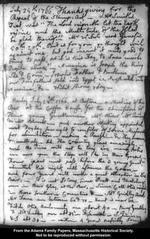
JULY 24TH. 1766.
Thanksgiving for the Repeal of the Stamp - Act. Mr. Smiths Text was "The Lord reigneth, let the Earth rejoice, and the Multitude of the Isles be glad thereof." Mr. Wibirts was Genesis 50th. 20th. -- "But as for you, ye thought evil against me; but god meant it unto good, to bring to pass, as it is this Day, to save much People alive." -- America is Joseph, the King Lords and Commons -- Josephs Father and Brothers. Our Forefathers sold into Egypt, i.e. Persecuted into America, &c. Wibirt shone, they say.
MONDAY JULY 28TH. 1766.
At Boston. A Meeting of the Bar at the Coffee House, for the Admission of Three young Gentlemen,
Mr. Oliver,
Mr. Quincy and
Mr. Blowers, and another Meeting appointed next
Fryday sennight, to consider of some Measures for Limitation, making a Pause, &c. They swarm and multiply. Sed, The Country grows amazingly, and the Time will not be long
e're, many who are now upon the Stage will be in their Graves. Four Years must pass, before the 3 young Gentlemen, admitted this night, will assume the Gown. And four Years will make a great alteration in the Bar. It is not so long, since Pratt and Thatcher were in their Glory, at the Bar. Since
Coll. Otis reigned in three southern Counties, &c.
Mr. Gridley And Mr. Dana are between 60 and 70. Kent is near 60. Fitch, Otis, Auchmuty are about 40 --
Benj. Gridley and Mr. Dudley are about 35 -- And Sewal, S. Quincy and I about 30. Within 4 Years possibly some
Page 20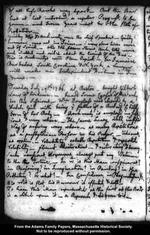
of all these Ranks may depart. But the Bar has at last introduced a regular Progress, to the Gown, and seven Years must be the State of Probation.
Gridley, Otis and Auchmuty were the chief Speakers. Gridley however was not in Trim. I never saw him more out of Spirits. Otis told some Stories, Auchmuty told more, and Scolded and rail'd about the lowness of the Fees. This is Auchmutys common Place Topick -- In Jamaica, Barbadoes, South Carolina, and N. York, a Lawyer will make an Independent Fortune in Ten Years.
TUESDAY JULY 29TH. 1766.
At Boston -- bought Gilberts Law of Evidence. Heard some Cases of Bastardy in the Sessions. William Douglass was charged by a Dutch Girl with being the father of a Bastard Child born of her Body. Auchmuty is employed, in sessions, and every where. The same heavy, dull, insipid Way of arguing every where -- as many Repetitions as a presbyterian Parson in his Prayer -- tedious as Applin. Volubility, voluble Repetition and repeated Volubility-fluent Reiterations, and reiterating Fluency. Such nauseous Eloquence always puts my Patience to the Torture. In what is this Man conspicuous? in Reasoning? in Imagination? in Painting? in the Pathetic? or what? In Confidence, in Dogmatism, &c. His Wit is flat, his Humour is affected, and dull.
To have this Man represented as the first at the Bar is a Libel upon it -- a Reproach and disgrace to it.
Page 21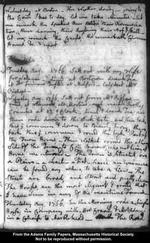
WEDNESDAY [30 JULY].
At Boston. The Weather cloudy. Going to the Common Pleas to day. Let me take Minutes. Let me remark the Speakers, their Action, their Pronunciation, there Learning, their Reasoning, their Art and skill. Let me remark the Causes, the remarkable Circumstances, &c. and report [sentence unfinished]
TUESDAY AUG. [5 or 12] 1766.
Satt out with my Wife for Salem -- dined at Boston -- drank Tea at Dr. Simons Tufts's at Medford -- lodg'd at Mr. Bishops.
WEDNESDAY AUG. [6 or 13] 1766.
Satt out from Mr. Bishops, oated, at Norwoods alias Martins, and reached Brother Cranches at 12 o Clock dined and drank Tea, and then rode down to the Neck Gate, and then back thro the common and down to Beverly Ferry, then back thro the common and round the back Part of the Town Home. Then Walked round the other Side of the Town to Coll. Browns, who not being at Home, we returned. The Town is situated on a Plain, a Level, a Flat -- scarce an Eminence can be found, any where, to take a View. The Streets are broad, and strait and pretty clean. The Houses are the most elegant and grand, that I have seen in any of the maritime Towns.
THURDSDAY AUG. [7 or 14] 1766.
In the Morning rode a single Horse, in Company with
Mrs. Cranch and
Mrs. Adams in a Chaise, to Marblehead.
[illegible] The Road
Page 22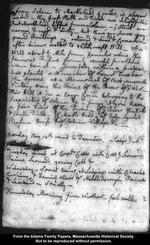
from Salem to Marblehead, 4 miles, is pleasant indeed. The Grass
Plotts and Fields are
delightfull. But Marblehead differs from Salem. The Streets are narrow, and rugged and dirty -- but there are some very grand Buildings. Returned and
din'd at Cranch's -- after dinner walked to Witchcraft Hill -- An Hill about 1/2 Mile from Cranches where the famous Persons formerly executed for Witches were buried. Somebody within a few Years has planted a Number of Locust Trees over the Graves, as a Memorial of that memorable Victory over the Prince of the Power of the Air. This Hill is in a large Common belonging to the Proprietors of Salem &c. From it you have a fair View of the Town, of the River, the North and South Fields -- of Marble Head -- of Judge Lynde's Pleasure House and of Salem Village &c.
MONDAY AUG. 18TH.
Went to Taunton. Lodged at McWhorters. [illegible]
TUESDAY [19 AUGUST].
Dined at Captn. Cobbs with Coll. G. Leonard, Paine, Leonard, young Cobb &c.
WEDNESDAY [20 AUGUST].
Spent Evening at Lodgings with Charles Cushing, and Daniel Oliver of Middleborough, Paine and Leonard -- socially.
THURDSDAY MORNING [21 AUGUST].
Fine Weather -- feel well.
Page 23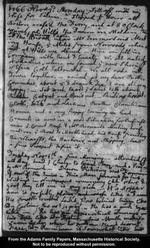
1766 NOVR. 3D. MONDAY.
Sett off, with my Wife for Salem. Stopped 1/2 Hour att Boston, cross'd the Ferry, and at 3 O Clock arrived at Hill's the Tavern in Malden, the Sign of the rising Eagle, at the Brook, near Mr. Emmersons [Emerson's] Meeting House, 5 Miles from Norwoods, where vizt. at Hills we dined. Here we fell in Company with Kent and Sewal. We all oated at Martins, where we found the new Sherriff of Essex Coll. Saltonstal. We all rode into Town together. Arrived at my dear Brother Cranches, about 8 and drank Tea, and are all very happy. Sat and heard the Ladies talk about Ribbon, Catgut and Paris net, Riding hoods, Cloth, Silk and Lace. -- Brother Cranch came Home, and a very happy Evening we had. Cranch is now in a good Situation for Business near the Court House and Mr. Bernards [Barnard's] Meeting house and on the Road to Marblehead -- his House fronting the Wharffs, the Harbour, and Shipping, has a fine Prospect before it.
TUESDAY NOVR. 4TH.
A fine Morning. Attended Court all Day, heard the Charge to Grand Jury, and a Prayer by Mr. Barnard.
Deacon Pickering was Foreman of one of the Juries. This Man, famous for his Writings in Newspapers concerning Church order and Government, they tell me is very rich. His Appearance is perfectly plain,
and coarse, like a Farmer. His smooth combed Locks flow behind him, like Deacon Cushing,
tho not so grey. He has a quick Eye like -- . He has an hypocritical Demure on his Face like Deacon Foster. His mouth makes a Semicircle, when he puts on that devout Face. Deacon Penniman is somewhat like him
Page 24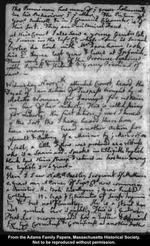
tho Penniman has more of the grave Solemnity in his
Behaviour than the other. The Picture of Govr. Endicott, &c. in the Council Chamber, is of this Sort. They are Puritanical Faces.
At this Court I also saw a young Gentleman lately sworn in the Inferiour Court, whose Name is Samuel Porter, he lived with Mr. Farnham, took his 2d. Degree last Year and lives at Ipswich. Thus every County of the Province, Swarms with Pupils and students and young Practicers of Law.
WEDNESDAY NOVR. 5TH.
Attended Court, heard the Tryal of an Action of Trespass brought by a Molatto Woman, for Damages, for restraining her of her Liberty. This is call'd suing for Liberty; the first Action that ever I knew, of the Sort, tho I have heard there have been many. Heard another Action for Assault and Battery, of a Mariner by the Master of a Vessell; a little Fellow was produced as a Witness who is a Spaniard -- speaks intelligible English -- black Eyes, thin, sharp Features -- has been among the English for 3 or 4. Years.
Here I saw Nathl. Peasley Sergeant of Methuen, 2 Years an Attorney of Superior Court, now commencing a Barister. He took his Degree the Year I entered Colledge. He has the Character of Sense, Ingenuity &c. but not of fluency. He is a stout Man, not genteel nor sprightly. This is the Gentleman whom Thatcher recommended for a Justice and Admired for his Correctness and Conciseness, as another Father Reed.
Page 25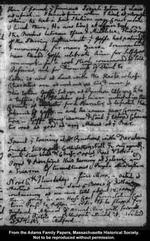
Here I found the famous Joseph Eaton, at Law as usual. I knew him when I lived at Worcester where he had a Suit, I believe every Court while I lived there. He now lives at Lynn End, on the Borders between Essex and Middlesex. This is one of the stirring Instruments that Goffe has patronised and encouraged, for many Years. I remember to have heard Goffe celebrate him for self Government -- for a cool steady command of his Passions, and for Firmness of Mind &c.
Eaton is now at Law with the Harts, whose Characters are as curious as his, and more so.
This Eaton Goffe set up, as Pynchon tells me, to be a justice, but Thatcher got him indicted in the County of Worcester Essex for a Barrator, which defeated the scheme of Goffe, and he came near Conviction. Goffe grew warm and said that Eaton's Character was as good as any Mans at the Bar.
Spent the Evening at Mr. Pynchons, with Farnham, Sewal, Sergeant,Coll. Saltonstall &c., very agreably. Punch, Wine, bread and Cheese, Apples, Pipes and Tobacco. Popes and Bonfires this Evening at Salem, and a Swarm of tumultuous People attending them.
NOVR. 6TH. THURDSDAY.
A fine Morn. Oated at Martins where we saw 5 Boxes of Dollars containing as we were told about 18,000 of them, going in an Horse Cart from Salem Custom House to Boston, in Order to be shipp'd for England. A Guard of Armed Men, with swords, Hangers, Pistols and Musquets, attended it. We dined at Dr. Tufts's, in Medford.
Page 26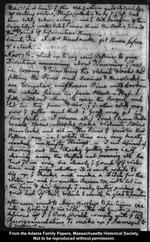
There I first heard that the old Custom and Priviledge of Electing orators, Thesis Collectors, &c. by the Class, has been lately taken away, and that this Invasion of their Priviledges, contributed more than the Butter towards the late Spirit of Insurrection there.
Drank Tea at Mrs. Kneelands. Got Home before 8 o Clock.
NOVR. 7TH.
Went up to my common Pasture, to give Directions [illegible] about Trimming the Trees, i.e. lopping and Trimming the Walnuts and Oaks and felling the Pines and Savines and Hemlocks. An irregular, misshapen Pine will darken the whole scene in some Places. These I fell, without Mercy, to open the Prospect and let in the sun and air, that the other Wood may grow the faster and that Grass may get in for feed. I prune all the Trees I leave, Buttonwoods, Elmes, Maples, Oaks, Walnuts, Savines, Hemlocks and all. The Pines that grow in that Pasture are, i.e. the white Pines are, very knotty, crooked, unthrifty Things. -- I am desirous of clearing out the Rocky Gutter, i.e. of clearing away the Bushes and pruning all the Trees that we may see clearly the Course of the Water there and judge whether it is worth while to dig up the Rocks, and make a Ditch for the Water. And for another Reason too, vizt. to let in the sun and Air, because that rocky Gutter produces a great deal of Feed, which I would be glad to sweeten.
Afternoon, went to Major Crosbeys to see him execute a Codicil to his Will. The old Gentleman is very desirous that the Province should comply with the [King's] Recommendation, to make up the Damages to the sufferers.
Page 27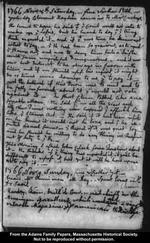
1766. NOVR. 8TH. SATURDAY.
Fine Weather still. -- Yesterday Clement Hayden came in to Major Crosbeys. He seem'd to hope, he said, that the Court would not vote to make up the Losses, but he heard to day that the King had requested it, and if that was true he knew not what to say. The K. had been so gracious, as to repeal the Stamp Act, and now to deny him such a Trifle would seem ungrateful and ungenerous. And it was our best Interest to be always in favour with him, and if we should refuse his request, it might be 10 times more damage to us, than to pay it. And He believed if this Town was to meet and to be fully informed, about it, they would not vote against it. In short Clem. talked like a reasonable Man. He said that, in all the Wars and all other Times, nothing ever happened that affected him like the Stamp Act. He said, if it had been insisted on, he knew it would not be born, and that he expected dismal scenes. The Repeal of it was great joy, and he should be willing to do any Thing in Reason out of Duty to the K.
This Morning I asked John Clark some Questions, about it. He thinks if the King has requested it, it will be difficult to refuse it, but yet it will be hard upon us to pay it.
1766. NOVR. 9. SUNDAY.
Fine Weather Yet. Heard Mr. Penniman all Day. Spent Evening with Dr. Savil.
MONDAY [10 NOVEMBER].
Rain. Kill'd Cow. Read chiefly in the American Gazeteers, which are a very valuable Magazine of american Knowledge.
Page 28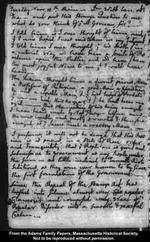
TUESDAY NOVR. 11TH.
Rain. Deacon Webb here at Tea, and put this strange Question to me, what do you think of the Lieutenant Governor, Sir?
I told him, what I once thought of him, and that I now hoped I was mistaken in my judgment. I told him I once thought, that his Death in a natural Way would have been a Smile of Providence upon the Public, and would have been the most joyful News to me that I could have heard.
The Deacon thought him a devout, pious Man, a Professer of Religion, a good Man, a Christian, &c., and a capable Man, and the best judge of Probate that ever we had, this 40 year, and that he had been envyed. This Observation of his being envyed I have heard made by Nat Thayer before now. -- He was capable, and greatly promoted and therefore envyed, at the same Time a craving Man. --
I presume, it will not be deny'd, that this Province is at present, in a State of Peace, order and Tranquility: that the People are as quiet and submissive to Government, as any People under the sun-as little inclined to Tumults, Riots, Seditions, as they were ever known to be, since the first foundation of the Government.
Since The Repeal of the Stamp Act, has hushed into silence almost every [illegible] popular Clamour, and composed every Wave of Popular Disorder into a smooth and peaceful Calm.
Page 29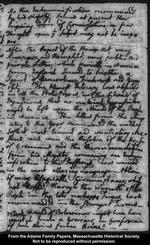
As the Indemnification, recommended by his Majesty, seems at present the reigning Topic of Conversation, a few Thoughts upon that Subject may not be improper .
After the Repeal of the Stamp Act, every Newspaper and Pamphlet, every public And private Letter, which arrived in America from England seemed to breathe a Spirit of Benevolence, Tenderness and Generosity. The Utmost Delicacy was observed in all the State Papers, in the Choice of Expressions, that no unkind Impression might be left upon the Minds of the People in America. The Letters from the Ministry to the Governor, recommended the mildest, softest, most lenient and conciliating Measures, and even the Resolve of the House of Commons and the Recommendation from his Majesty, concerning an Indemnification to the Sufferers, was conceived in the most alluring Language. Oblivion of every disagreable Circumstance, which had happened, through the Warmth of the People in the late unhappy Times, was recommended -- in the strongest Terms.
What Kind of Behaviour might have been expected from a Governor, in Consequence of such Advices from Home?
Page 30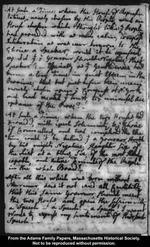
At such a Time, when the House of Representatives, newly chosen by the People, and an House which thought like the People, had proceeded with as much calm, composed Deliberation as was ever known, to the Choice [of] a Speaker, would it be [illegible] expected that the Governor should Negative that Speaker? Especially as that Gentleman had been a long Time in great Esteem in the Province, had but just before been unanimously chosen upon the Congress at N. York and had executed that Trust, to the universal Acceptance of the Province?
At such a Time, when the two Houses had proceeded, with equal Solemnity, to the Choice of Councillors, and had compleated the Election, could it be believed that a Governor should by his mighty Negative, slaughter six of the List at a blow, six of the most steady, capable, and Active Friends of the People in the whole Board?
After all this which was born without a Murmur, does it not exceed all Credibility, that this same Governor should meet the two Houses, and open the Session with a Speech -- a Speech! -- a Speech! I want Words to express my Sentiments of this Speech!
Page 31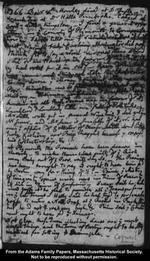
1766 DECR. 8TH. MONDAY.
Dined at Dr. Tufts's. Drank Tea at Dr. Halls Pembroke. Lodged at Captn. Littles Kingston. -- I find a general Opposition in the County of Plymouth, to Compensation. Jacobs tells me, that Scituate voted vs. it with great Warmth. Judge Cushing Moderator did not think fit to say a Word, nor was there a Word said or an Hand up in favour of the Bill, tho they had voted for it in October. Keen of Pembroke was warm and stumped Sole [Soul or Soule] the Moderator to lay down the Money and prevent a Tax upon the Poor. Kingston was so fixed vs. it that they would not call a Meeting. The more considerate and sensible People however in all these Towns are in favour of it. Landlord and Landlady Little are full of Politicks. Mr. Little would get in General Winslow, and did get in Mr. Sever -- and Mr. Sever is sensible of it. We had over the affair of Collector of Excise. Little dont like Judge Cushing nor Brig [Brigadier] Ruggles, because they opposed his Collectorship, &c.
At Plymouth the Province have been drawn in cleverly -- to make themselves guilty of the Riots. Every Body out of the Prov. [Province] will say so. The Province has been brought to pay what ought to have been paid by Boston, every farthing of it.
Paine. The Mistery of Iniquity opens more now in time of Peace than it did in Time of Confusion.
Sever said he believed Goffe would be glad to punish all the Transgressors in the late Times. Hally said he had tryed to persuade Goffe to enter a Nolle Pros. vs. the Rioters in Berkshire, but he would not and was very high &c. Paine said the Continent ought to have paid the Damage.
Nat Clap. These Town Meeting Laws are the most awful Things, and the Town of Boston ought to be stigmatized for setting the Example.
Page 32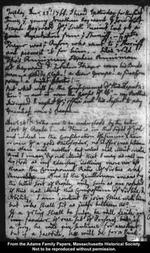
TUESDAY DECR. 23D. 1766.
I heard Yesterday, for the first Time, that young Jonathan Wayward, the Son of Lt. Joseph Hayward of the South Precinct, had got a Deputation from the Sherriff. Captn. Thayer was the Person, who went to the Sherriff and procur'd it for him. Silas Wild, Tho's Penniman, Stephen Penniman, Lt. Hayward and Zebulon Thayer were his Bondsmen-a goodly Class! a clever Groupe! a fine Company! a bright Cluster!
But what will be the Consequences of this Deputation? -- and what were the Causes of it? My Brothers Disregard and neglect of the office and his Neglect to pay Greenleaf, were the Causes.
DECR. 24TH.
Who are to be understood by the better Sort of People? There is in the Sight of God and indeed in the Consideration of a sincere Xtian or even of a good Philosopher, no Difference between one Man and another, but what real Merit creates. And I mean, by real Merit, that I may [be] as well understood as my Adversary, nothing more nor less than the Compound Ratio of Virtue and Knowledge. Now if the Gentleman means by the better sort of People, only such as are possessed of this real Merit, this Composition of Virtue and Ability, I am content to join Issue with him but who shall sit as judge between Us? -- If a Whig shall be judge, he will decide in myfavour of one set of Persons, but if a Tory, he will give sentence for another; but if a Jacobite, he will be for a third.
Page 33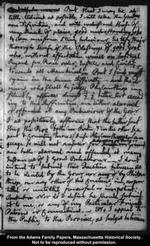
[illegible] But that I may be as little tedious as possible, I will take the Gentlemans own
Difinition, and will understand those of every Rank of plain, good understanding, who by an uniform steady
behaviour, testify their thorough sense of the Blessings of good Government, who without Affectation evince an habitual Regard for Peace, order, justice and Civility, towards all Mankind. But I find myself again in the same Difficulty. And the Q. recurs, who shall be judge. Phylanthrop confidently
denys that the better Sort according to this
Deffinition, are either alarmed or offended at any
Behaviour of the Governor. I as
possitively affirm, that the better sort
thro the Province both in Boston and in the other seaport and Country Towns (I use Phylanthrops Language so will not answer for
sense nor Accuracy of Writing or Grammar) are both alarmed and offended, at many Instances of the Governors
Behaviour. I dont intend to submit this Question between Us to be decided by the Governor, nor
any of by Philanthrop, nor any other of his Creatures, rich, nor poor, titled or untitled, powerful or impotent:
But I Nor do I desire he should submit it to me, or any of my Particular Friends, Patrons or Connections. -- No I appeal to the Public, to the Province, as judges between
Page 34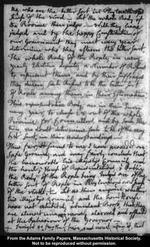
Us, who are the better sort, in Phylanthrops sense of the Word. Let the whole Body of the Province then judge. -- Well they have judged and by the happy Constitution of our Government, they must every Year determine who they esteem the better sort. The whole Body of the People, in every Yearly Election, depute a Number of Persons to represent them, and by their suffrages they declare such Persons to be the better sort of People among them, in their Estimation. This representative Body are in their Turn every Year, to
chuse 28 out of the whole Province for Councillors, and by such Election, no doubt determine such to be of the very best sort, in their Understandings.
Thus far, It seems to me, I have proceeded on safe Ground, and may fairly conclude that the
honourable his Majestys Council, and the
honourable the House of Representatives, the Public, the Body of the People being judges, are of the better sort of People in Phylanthrops own sense of the Words. I might go further here, and insist upon it, that
Page 35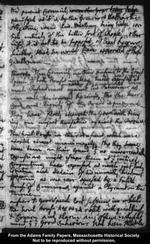
the present Council,
[illegible] being Judge purifyed as it is, by the Governors Cathartic Negative, even his Excellency being judge, consists entirely of the better sort of People. Otherwise, it is not to be supposed, at least by our scribler, that he would have approved of those Gentlemen. Let Us then
enquire, whether his Majestys Council, and the
honourable House have not exhibited abundant Proofs, that they are almost unanimously alarmed and offended at the
Behaviour of the Governor.
[illegible] The Council, in their Answer to the Governors Speech to both Houses in May, have expressed as much Resentment against his Behaviour as can well be conveyed by Words, 'tho the Decorum and Dignity of the Board is preserved. They have flatly charged the Governor with bringing an unjust Accusation against the Province.
The honourable House in their Answers, which were adopted almost unanimously, tho they have been on their Guard, that no unwarrantable Expressions might escape them at that critical Conjuncture, have expressed as much just Indignation and disdain of his unworthy treatment of them, as was ever expressed by a british House of Commons, against a Tyrant on the Throne.
Answer to Governor
[Governor's] Speech last Session, in which the
honourable House, 48
vs. 24 voted, with great Grief, and Concern and Alarm and
Offence its Resentment, that the Governors
Behaviour had been the sole
Page 36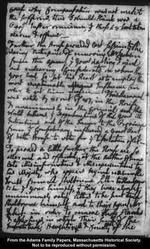
Cause why Compensation was not made to the sufferers. This I should think was a Proof Instar omnium, that those 48 had taken alarm and
offence.
Further, the House proceeded last session to the daring Enterprise of removing Mr. Jackson from the Agency, the Governors darling Friend and endearing Confederate, on whom the Governor had so set his Heart as to employ the most exceptionable Means Influence in order to get him chosen. This Removal was voted by 81 out of 87 in the House and unanimously in the Council, and the World believes, that Apprehensions of the Governors ill Intentions, and of the Danger to the Province from that Confederacy, influenced a Great Part of both Houses to vote for the Dissolution of it.
To proceed a little further, the House are so
allarmed and offended, at the Author of some late Misinformations and Misrepresentations to his Majesty, who appears beyond reasonable Doubt from Ld. Shelbournes Letter to be the Governor himself, that they have almost unanimously voted Letters to be sent to Ld. Shelbourne himself, and to their Agent, Mr. Debert, in order to remove those slanders and aspersions, in which their sense of the Ingratitude, Haughtiness and Cruelty of the
Page 37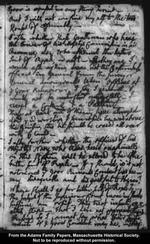
Governor is expressed in very strong Terms.
But I will not confine my self to the two Houses of Assembly.
I ask whether those Gentlemen who have the Honour of his Majestys Commissions in his Revenue, are to be esteemed the better Sort of People, or not? If they are, I would ask again, have not the Customhouse Officers in General from the surveyor General downwards taken Offence at the Governor [Governor's] Behaviour. I say I [in] general -- I would not be understood universally. I except a C-k-e and a Paxton. These at least one of them, have always declared they would worship the sun while he was above the Horison, tho he should be covered all over with Clouds.
I ask further whether the Officers of his Majestys Navy, who have been occasionally on this station, will be allowed to be the better sort of People. If they should, is it not notorious that Govr. Bernards Conduct has been very disagreable and disgustful to them?
Where shall I go for better sort of People? The judges of the
superiour Court, move in so sublime an orbit -- They tread in such exalted steps -- That I dare not approach their Persons, so I cannot say what their sentiments of the Governors Conduct may be.
Page 38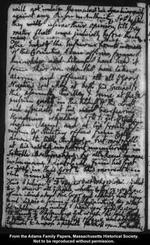
They will not indulge themselves in speaking openly against any Person in Authority, so I believe they reserve their Opinion, till the Matter shall come judicially before them. Many
[of] the judges of the
Inferiour Courts in many of the Counties, I can affirm, from Knowledge, because I have heard it from their own Mouths, have taken Alarm and
offence,
att all the Governors Negatives last May, at both his Speeches to the Assembly in May and June, at the Expression quoted in the Address of the Lords, and especially at his
[illegible] overbearing,
threatning, wheedling Arts to get Mr. Jackson chosen Agent, and at his foolish Dismission of Military officers from Colonels down to little Ensigns - but most of all at his restless, impatient, uncontrouble
[uncontroulable], insatiable Machinations, by all Means, humane, inhumane, and diabolical, from his first Arrival in this Government to this moment, to enrich himself.
Thus I believe that it appears to all who consider the Matter, that almost all the People, whether better or worse, are of one Mind about the Governor and absolutely hate him and despize him -- let Phylanthrop say what he will. And indeed I have very good Reasons to think that Phylanthrop lyed when he said that the better sort had taken no Offence, and absolutely endeavoured to impose a palpable falshood upon the Public.
Page 39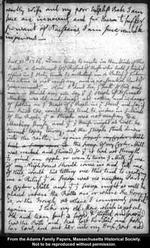
DECR. 31ST. 1766.
"Whatever tends to create in the Minds of the People, a Contempt of the Persons of those who hold the highest Offices in the State, tends to a Belief that Subordination is not necessary, and is no essential Part of Government." -- Now I dont See the Truth of this. Should
any one say that the Steeple of Dr. Sewals Meeting was old, and
decay'd and rotten, and in danger of falling on the Heads of the People in the Street, and say it in Print too, would this tend to induce in the Minds of the People, that a Steeple was not necessary to a Meeting House, and that the House might as well be turned topsy turvy, and the steeple struck down into the Earth. Again suppose
my cyder Mill had a sweep upon it the sweep of my
Cyder Mill was cracked and shivered so that it had not strength to grind an Apple or even to turn the Mill, if one of my
Neighbours should come in and tell me of this, would his telling me this tend to create in me a Belief that a Sweep was no necessary Part of a
Cyder Mill, and that the Sweep might as well be placed where the Rolls are, or where the Hopper is, or the Trough, as where I commonly put it? Again, I take my old Mare, which is not only old and lean, but is
hipp'd and stifled and spavined, has the Botts and has lost her Tail and both her Ears, and put her into my Horse Cart and
Page 40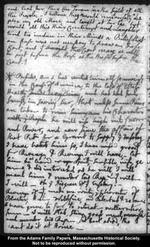
lead her
thro the Town in the Sight of all the People. I believe they would universally
despize my old Mare, and laugh at her too. But would all this their Contempt and Laughter tend to induce in their Minds a Belief that an Horse was not necessary to draw an Horse Cart, and that
[illegible] the Cart may as well be put before the Horse, as the Horse before the Cart?
*Besides, O--s has exerted himself so amazingly in the Cause of America, to the loss of Estate, Health, Trade and every Thing, and has had such Success, in saving her, that unless some Pains are taken to ruin his Character with the People he will rise high into favour and Power, and ever since the Affair of that Petition for a Grant to supply the Insolvency I have hated him so, I have groaned for Revenge, and Revenge I will have, let him be as learned, spirited, sensible, wise, generous, and disinterested as he will, I will maul him and murder his Rep. [Reputation]. I will -- I will. Oh the Disgrace of that Insolvency!
Revenge of that, made me write the Character of Bluster, Hector, Wildfire, and Belzebub and 20 more. I have gone too far to retreat Nullar retror sum. I will stab, sting, goad, maul, mangle and murder his Rep [Reputation] -- at least abroad, tho I cant do it at Home.
Page 41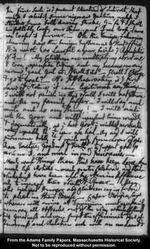
In fine such is the present Situation of Interests, that unless I exhibit some vigorous Exertion, unless I strike some bold daring Stroke, G--fe and I shall infallibly loose our Aim, and if we loose it now we loose it forever. Oh the [illegible] chearing Rays, the benign Influences of that office. It is worth 200 Lawful a year, besides the Reputation of it! My Children are multiplying about me, I love expensive living, and my meanes are very narrow. Good God what shall I do? Shall I starve and go to Goal? No, Self Preservation is the first Law of Nature, it can legitimate any Thing. I will not perish in this World, I will not starve and see my family suffer. I will say and write and do any Thing! I will vindicate the Governor, and will represent him roundly and dogmatically, as the best Governor, the mildest, most moderate, capable &c. that ever we had. Ay and I will pronounce boldly that I write only from Love of Order, Peace, Justice, Goodness and Truth -- to support good Government, and much injured Innocence.
Much worse Things than this have been done from much less
[worthy] Motives. Much greater
falshoods, and
[illegible] Wickedness have been used by Men in Affluence only to increase their Wealth and Power. Men who had not Hunger, and Children crying for bread to plead in their Excuse. Caesar Borgia says whoever will arrive at Dominion, must necessarily remove all Obstacles out of the Way which obstruct his Greatness, and even forget the effeminate
Tyes of Tenderness and Relation and with an undaunted
Page 42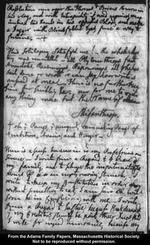
Resolution run over the Thorns and Briars thrown in his Way, and with Intrepidity if need requires, even imbrue his Hands in his opposers Blood, and make a Dagger with Blindfolded Eyes, force a way to fortune. -- Oh the Pangs, the pungent, excruciating Pangs of Ambition, Avarice, and Hunger.
There is a sense however in which my Professions are sincere. -- I write from a Regard to the Peace of my family, and to silence the importunate Clamours of an empty craving
stomack. I write to keep my Constitution in order for without something to eat, I am sure all will soon be in Confusion, with me. I write from a Regard to justice, because that demands that my Creditors should be paid their Dues, And I write for injured Innocence, because my
Page 43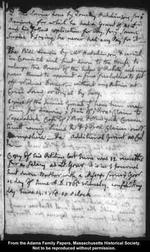
worthy Wife and my poor helpless Babe I am sure are innocent, and for them to suffer for want of Necessaries, I am sure, would be injurious.
This Soliloquy satisfy'd me! The whole Mystery was unriddled -- all Phylanthrops facts, Anecdotes, Reasonings, Vapourings, all that he has said, done or wrote or can say, do or write is answered at once. There is no further occasion for scribling &c. nor for me to write any Thing more but the Name of [illegible] Misanthrop.
[1766]
["This and the following entry appear on a separate folded sheet laid in at the end of this Diary booklet." ] Q [Query]. The Service done by Tommy Hutchinson, for the Province, for which he had a Grant of 40. and his fathers application for Pay, for the same Service and saying, he never had any Pay for it.
The Bill drawn by Mr. Hutchinson, and carried in Council and sent down to the House, to enlarge the Power of the Judges of Probate, and empower them to appoint a few freeholders to set off Widows Dower -- without any Action at Common Law, or Tryal by Jury.
Copies of the several Grants that have been made him, for drawing the state of the Province's Claim to Sagadahock, Case of the Prov. and New York, Connecticutt [illegible] Lines &c. and the Prov. Claim on N. Hampshire -- &c. Additional Grant as [Chief ] [Justice] &c.
Copy of his Petition last June was 12 months for a salary as Lieutenant Governor. It is in the Journal sent down together with a Message from the Governor 12 day of June A.D. 1765 Wednesday. Considered Fryday June 14. 1765 10 O clock.
Page 44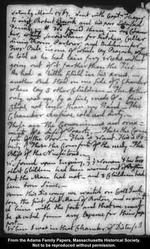
SATURDAY MARCH 1767.
Went with Captn. Thayer to visit Robert Peacock and his poor distressed Family. We found them, in one Chamber, which serves them for Kitchen, Cellar, dining Room, Parlour, and Bedchamber. Two Beds, in one of which lay Peacock, where he told us he had lain for 7 Weeks, without going out of it farther than the Fire. He had a little Child in his Arms. Another Bed stood on one side of the Chamber where lay 3 other Children. The Mother only was up, by a fire, made of a few Chips, not larger than my Hand. The Chamber excessive cold and dirty.
These are the Conveniences and ornaments of a Life of Poverty. These the Comforts of the Poor. This is Want. This is Poverty! These the Comforts of the needy. The Bliss of the Necessitous.
We found upon Enquiry, that the Woman and her two oldest Children had been warned out of Boston. But the Man had not, and 3 Children had been born since.
Upon this Discovery we waited on Coll. Jackson, the first Select Man of Boston, and acquainted him with the facts and that we must be excused from any Expence for their Support.
When I was in that Chamber of Distress I
Page 45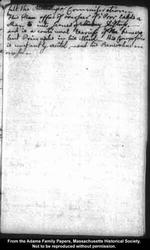
felt the Meltings of Commiseration. This Office of Overseer of the Poor leads a Man into scenes of
[illegible] Distress, and is a continual Exercise of the benevolent Principles in his Mind. His Compassion is constantly excited, and his Benevolence
encreased.
Pages 46 - 56
[Blank pages -- no images available]
End-paper
End-paper
End-paper
End-paper
Inside Back Cover
Back Cover
[Blank page -- no image available]














































